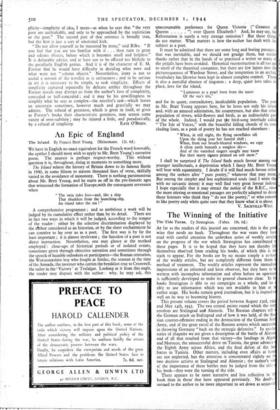An Epic of England
The Island. By Francis Brett Young. (Heinemann. 12s. 6d.) • WE have in English no exact equivalent for the French word honorable, the epithet I should most wish to apply to Mr. Brett Young's narrative poem. The nearest is perhaps respect-worthy. This without question it is, throughout, rising at moments to something more. The Island relates the history of Britain down to its famous Battle in 1940, in some fifteen to sixteen thousand lines of verse, skilfully varied in the avoidance of monotony. ' There is nothing parsimonious about Mr. Brett Young, and he starts us off in the pre-historic ages that witnessed the formation of Europe,with the consequent severance when " The twin tides kiss—and, like a ship That shudders from the launching-slip, An island takes the sea ! "
A comprehensive programme ; and so ambitious a work will be judged by its cumulative effect rather than by its detail. There are in fact two ways in which it will be judged, according to the temper of the reader : either by the selective discrimination displayed by the author considered as an historian, or by the sheer enchantment he can contrive to lay over us as a poet. The first way is by far the least important ; it is almost irrelevant ; the function of a poet is not direct instruction. Nevertheless, one may glance at the method employed : close-ups of historical periods or of isolated events, sometimes given through objective narration and sometimes through the speech of humble onlookers or participants—the Roman centurion, the Worcestershire boy who fought at Senlac, the seaman at the time of the Armada, the taverner who carries the breakfast-tray to Cromwell, the sailor in the Victory ' at Trafalgar. Looking at it from this angle, the reader may dispute with the author : why, he may ask, this unaccountable preference for Queen Victoria (" Greatest o
Queens ") over Queen Elizabeth ? And, he may say, the Reformation is surely a very strange omission ? But these things do not matter. What matters is how the author has dealt with his subject as a poet.
It must be admitted that there are some long and boring passages ; that was inevitable, and we should not grudge them, but render thanks rather that in the hands of so practised a writer so many o the pitfalls have been avoided. Historical reconstruction is all too apt to smell of the theatrical costumier, but there are few lapses into t picturesqueness of Wardour Street, and the temptation to an archaic vocabulary has likewise been kept in almost complete control. There is also a merciful absence of jingoism ; a deep, quiet love takes it place, love for the island, " Luminous as a pearl born from the nacre Of the sea's iris," and for its queer, contradictory, incalculable population. The p in Mr. Brett Young appears here, for he loves not only his islan and, with an amused admiration, his countrymen, but also that oche population of rivers, wild-flowers and birds, as an indissoluble p of the whole. Indeed, I would put tilfe bird-song interlude calle " The Isle of Voices," with the beautiful falling chords of its con eluding lines, as a peak of poetry he has not reached elsewhere :
" When, in still night, the flying snowflakes sift Upon the dying year her funeral shift ; When, from our breath-bleared windows, we espy A silent earth beneath a songless sky— And of the vanished singers naught may know But their starry signets printed on soft snow."
I shall be surprised if The Island finds much favour among o younger intellectuals, a deprivation which I fancy Mr. Brett Youn will bear with equanimity. I doubt if it will find much favour eithe among the seekers after " pure poetry," whatever that may me But among the simpler and less sophisticated souls (and I write t with no sarcastic intent) it may .well find very great favour inde I hope especially that it may attract the notice of the B.B.C., sin the more stirring or emotional passages are perfectly adapted to deco those listeners who think they " do not like poetry," or who consen to like poetry only when quite sure that they know what it is about.
V. SACKVILLE-WEST.


























 Previous page
Previous page